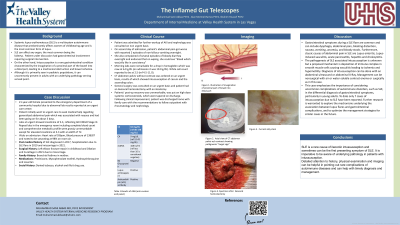Tuesday Poster Session
Category: Colon
P3794 - The Inflamed Gut Telescopes
Tuesday, October 29, 2024
10:30 AM - 4:00 PM ET
Location: Exhibit Hall E

Has Audio

Muhammad s. Abbas, MD, MBBS
Valley Health System
Las Vegas, NV
Presenting Author(s)
Muhammad s. Abbas, MD, MBBS, Alan M. Ramos, MD, Ibrahim Youssef, MD, Hossein Akhondi, MD
Valley Health System, Las Vegas, NV
Introduction: SLE is a multi-system autoimmune disorder that predominantly affects women of child bearing age. SLE can affect any organ, however most common organ affected are the kidneys. Our patient had GI involvement that required surgical intervention.
Intussusception is a GI condition characterized by invagination of the proximal bowel into distal part. Although it is primarily seen in pediatric populations, it can uncommonly present in adult populations. Patient under discussion had SLE and it is proposed that one of GI manifestations of SLE is that it can serve as lead point for pathogenesis of intussusception.
Case Description/Methods: 21 year female presented with past medical history of SLE presented the ED due to abnormal lab results in an urgent care setting indicative of acute kidney injury KDIGO stage 3. She was admitted to med-tele for further observation, however during the course of admission, was noted to be in SLE flare and developed hematochezia. Further work up which included CT imaging revealed target sign on cecum and ascending colon which is pathognomonic for intussusception. Patient under discussion had successful ileocecal hemicolectomy without any post-operative complications.
Discussion: Gastrointestinal symptoms during SLE flare are common and can include symptoms like dysphagia, abdominal pain, bloating related distension, nausea, vomiting , anorexia and bloody stools. Classic causes of gastrointestinal symptoms in SLE are Lupus enteritis, Lupus induced vasculitis, acute pancreatitis, hepatitis and cholecystitis.
Pathogenesis of SLE associated intussusception is unknown but a proposed mechanism is deposition of immune complex in smooth muscle cells and vasculitis leading to ischemia and hypomotility which ultimately serves as a lead point.
This case highly emphasized the importance of having a broad minded approach while approaching patients with SLE flare having gastrointestinal symptoms. Detailed attention to history, physical examination and imaging can be helpful in pointing out rare complications of autoimmune diseases such as the one in patient under discussion which can help with timely diagnosis and management.
To date there are only 7 cases of intussusception due to SLE which have been reported in the literature. Further research is definitely warranted to explore the mechanisms underlying the association between lupus flares and gastrointestinal complications, and optimize management strategies for similar cases in future.
Disclosures:
Muhammad s. Abbas, MD, MBBS, Alan M. Ramos, MD, Ibrahim Youssef, MD, Hossein Akhondi, MD. P3794 - The Inflamed Gut Telescopes, ACG 2024 Annual Scientific Meeting Abstracts. Philadelphia, PA: American College of Gastroenterology.
Valley Health System, Las Vegas, NV
Introduction: SLE is a multi-system autoimmune disorder that predominantly affects women of child bearing age. SLE can affect any organ, however most common organ affected are the kidneys. Our patient had GI involvement that required surgical intervention.
Intussusception is a GI condition characterized by invagination of the proximal bowel into distal part. Although it is primarily seen in pediatric populations, it can uncommonly present in adult populations. Patient under discussion had SLE and it is proposed that one of GI manifestations of SLE is that it can serve as lead point for pathogenesis of intussusception.
Case Description/Methods: 21 year female presented with past medical history of SLE presented the ED due to abnormal lab results in an urgent care setting indicative of acute kidney injury KDIGO stage 3. She was admitted to med-tele for further observation, however during the course of admission, was noted to be in SLE flare and developed hematochezia. Further work up which included CT imaging revealed target sign on cecum and ascending colon which is pathognomonic for intussusception. Patient under discussion had successful ileocecal hemicolectomy without any post-operative complications.
Discussion: Gastrointestinal symptoms during SLE flare are common and can include symptoms like dysphagia, abdominal pain, bloating related distension, nausea, vomiting , anorexia and bloody stools. Classic causes of gastrointestinal symptoms in SLE are Lupus enteritis, Lupus induced vasculitis, acute pancreatitis, hepatitis and cholecystitis.
Pathogenesis of SLE associated intussusception is unknown but a proposed mechanism is deposition of immune complex in smooth muscle cells and vasculitis leading to ischemia and hypomotility which ultimately serves as a lead point.
This case highly emphasized the importance of having a broad minded approach while approaching patients with SLE flare having gastrointestinal symptoms. Detailed attention to history, physical examination and imaging can be helpful in pointing out rare complications of autoimmune diseases such as the one in patient under discussion which can help with timely diagnosis and management.
To date there are only 7 cases of intussusception due to SLE which have been reported in the literature. Further research is definitely warranted to explore the mechanisms underlying the association between lupus flares and gastrointestinal complications, and optimize management strategies for similar cases in future.
Disclosures:
Muhammad Abbas indicated no relevant financial relationships.
Alan Ramos indicated no relevant financial relationships.
Ibrahim Youssef indicated no relevant financial relationships.
Hossein Akhondi indicated no relevant financial relationships.
Muhammad s. Abbas, MD, MBBS, Alan M. Ramos, MD, Ibrahim Youssef, MD, Hossein Akhondi, MD. P3794 - The Inflamed Gut Telescopes, ACG 2024 Annual Scientific Meeting Abstracts. Philadelphia, PA: American College of Gastroenterology.
